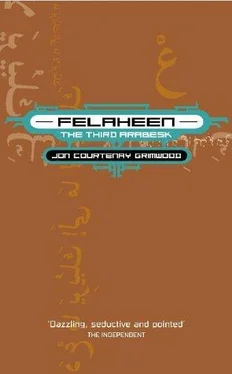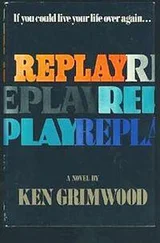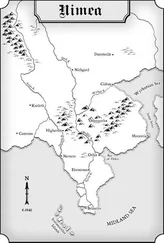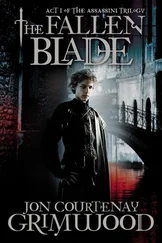He'd wanted to destroy the biology building. An ugly block of cheap polycrete faced with pine slats like some tatty ski lodge. That was where the animal experiments were done. Where frogs were dissected and roadkill skinned to reveal underlying muscle structure. Where he'd been made to peg out the pelt of a badger and rub salt into stinking leather, having first scraped it so thin that in places it looked almost translucent. "What's done is done," Raf told himself and headed into another alley, stopping at a door to kick it open. "So why cry?" The question was rhetorical, Raf accepted that. But he answered it all the same.
"No reason."
He was beginning to see how it worked. Every question he'd ever asked the fox he answered for himself. Pulling information from memory to provide those clinically precise, unhelpful answers. Sweating the small stuff to make the big stuff go away. His life had been one long refusal to take the real facts and make them add up.
Raf searched the house swiftly, five rooms on three floors, saying nothing to the frightened inhabitants. On his way out he shook his head at a couple of conscripts on their way in. "Empty," Raf told them. "No one hiding."
Why was he upset? Good question.
Tiri had been kept in a wire cage at the rear of the biology block. Most of the smaller animals lived inside. Hamsters and rats, mice bred for so many generations that generations of biology masters had lost count. A black widow spider permanently catatonic with cold. Sickly stick insects. Guppies in water thicker than fog. And a single, magnificent Siamese fighting fish, all broken fins and ragged tail.
Raf freed the rats and shook the stick insects onto grass at the front of the block. This had seemed like a good idea at the time. Although later, looking down from his burning attic at fire trucks lining up on the lawn he realized he hadn't given them a better life at all. He hadn't known what to do with the fish so he removed most of the water from the guppies because their tank was dirtier than that of the Siamese fighting fish, then tipped one tank into the other. If Raf couldn't free the fighting fish he could at least give it a decent meal.
He'd never liked guppies anyway.
Some soldier had lit the spotlights around Domus Aurea but these only did what they were meant to do, threw walls into relief or picked out aspects of architectural interest.
There were trucks on the road beyond the medina, circling the old city walls with soldiers hanging from their open doors. Kashif Pasha's men. All of them searching for him. A grinding of gears came from a square ahead, more trucks arriving for the hunt. From Raf's left came shouted orders. Farther away, to his right, beyond a low line of workshops, more orders, more shouting. Engines racing and truck doors that slammed.
This was no way to track a fugitive. Even without the fox Raf knew that. Or rather he knew that without needing the fox, because he was the fox. One and the same. Separated not at birth but standing on that burning girder. What Raf knew (such as it was), he knew for himself and in himself. Just as Raf knew that he needed to get out there. To become himself. A man with responsibilities and a life.
And if not a man, then whatever he was.
CHAPTER 32
Wednesday 2nd March
On the dirt track a group of hunters struggled with a dead boar. They had its carcass lashed to a pole and slung between two of their party. A third man had a Ruger across his back and carried the rifles of the first two, one slung under each arm. Behind those three walked two more men, rifles ported across their broad chests.
Gravel crunched beneath their boots and each wore a loden coat with broad belt, tweed plus fours and long woollen socks.
Every last one of them watched the Bugatti Royale grind past. All their guns had telescopic sights and featured extended magazines that came only as an (expensive) optional extra. The man at the back had two dead rabbits hanging from his belt.
"Season ends in about three weeks," said Hani. She waved to the hunters, who stared back, eyes hard. The Bugatti, one of only seven ever made, had been climbing for the last five minutes towards a distant farmhouse that kept vanishing behind the hill. The track over which it rattled was rough, edged with thorn and a few bare oaks unwilling to accept that spring was due.
"There it is . . ."
Thick walls washed white under a roof of red pantiles. Windows kept small to protect the inside from winter winds. Protecting the glass were oak shutters, their wood stripped bare by winter frost and summer heat. A hunting lodge really, built by a wine shipper from Cahors. It could have been lifted wholesale from the Lot valley and set down amid the pines and oaks of Ifriqiya's rugged north coast.
Its original owner was long dead. His marble tomb was decaying in a colonial churchyard where a pubescent angel stood guard over his final resting place, her downcast eyes at odds with the plumpness of her body and the thinness of her robes. Now she waited, rendered wingless by vandals, an atrocity victim waiting for eternity.
Claude Bouteloup began his life as a peasant farmer and ended it a baron, gold having dug deep enough to discover a previously overlooked family title. The walls of his old home remained lined with heads taken from the boar he'd shot in the Northern Tell. An implausible spread of horns over the main door stood memory to his plan to reintroduce aurochs, a few of which still roamed the hills, but fewer by the year.
All this Hani read out to Murad and Raf as her uncle yanked the Bugatti's fourteen-foot wheelbase round a tight bend in the dirt road while trying to ignore a drop that fell away to a white, storm-fed river far below.
"Put the book down," Raf told her. "Before you make yourself feel sick."
"Too late," said Hani. She flicked backwards for a few pages, then flicked forward. "This guide doesn't say who owns it now," she complained, skim-reading the entry again.
"It wouldn't," said Raf.
The first clue that this wasn't just another hunting lodge came at the gates. These looked normal until Raf got close enough to see otherwise. Tiny cameras tracked his arrival, watching from stone gateposts where they were bolted discreetly between the open claws of granite eagles.
Micromesh, fine enough to be virtually invisible, lined the far side of the gate's flowing wrought iron. Its heavy, old-fashioned lock was electronic. Cracking paint covered hinges that Raf was willing to bet conformed to some exacting military standard he didn't even know existed.
"You step out of the car," said Murad. "And then someone opens the gates if they like the look of you . . . I've been here before," he added, without glancing up from his toy Ninja Nizam. Hani and he had spent from Tunis to Bizerte arguing about whether or not action figures were childish.
Hani kept on saying they were. Until finally Murad announced that as Hani did nothing but play with a stupid cat, her opinion didn't count.
"Ifritah's not a toy."
"Did I say she was?"
After that came blessed silence, from Bizerte to just past Cap Serrat, where Raf turned the Bugatti off the crumbling blacktop onto something that barely qualified as track. The Ettore-Bugatti-built coupé Napoleon had been a present from the Prince Imperial in Paris to the Emir's grandfather and, until Raf claimed it, had been garaged in a mews at the back of the Bardo Palace.
No one had dared to stop Raf from commandeering the 275bhp, 12.8-litre monster. But then, from the chamberlain who ran the nearly empty palace to the uniformed sailor who first saw a blond notable in shades and black Armani suit striding towards its main door, no one had known how to treat Ashraf al-Mansur at all.
Читать дальше












